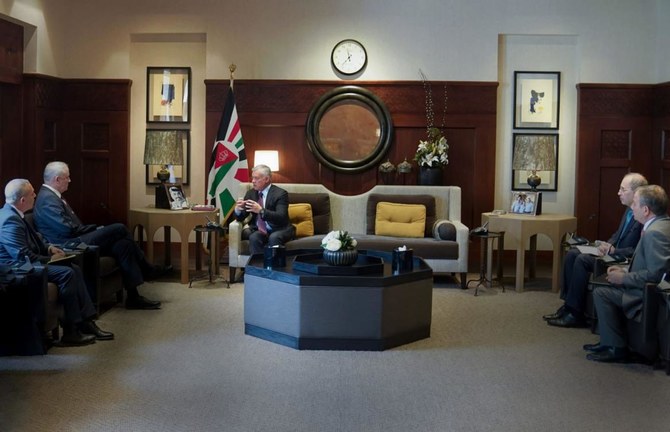AMMAN: Jordan’s King Abdullah on Tuesday met with Israeli Defence Minister Benny Gantz in Amman, just one day following the Jordanian monarch’s meeting with Palestinian President Mahmoud Abbas in Ramallah.
The meeting was part of King Abdullah’s efforts to create a new horizon to achieve just and comprehensive peace on the basis of the two-state solution, according to a Jordanian Royal Court statement.
The King reiterated the need to respect and preserve the historic and legal status quo of Jerusalem and to remove all obstacles hindering the freedom of worship in the old city ahead of the holy month of Ramadan, the statement said.
Jordan has been the custodian of Jerusalem’s Islamic and Christian holy sites since the 1920s. The Jordanian custodianship was reaffirmed in the peace deal with Israel in 1994.
The Israeli media quoted a statement from Gantz’s office saying that the defense minister discussed with the king the steps that Israel intends to take ahead of Ramadan in order to preserve freedom of worship in Jerusalem and the West Bank. Gantz also discussed security coordination during the holy days as well as additional steps that could be taken to improve the lives of Palestinians.
King Abdullah and Gantz also met in Amman in January this year, marking the first high-profile Jordanian-Israeli meeting in years. The meeting followed the strained Amman-Tel Aviv relationship during Benjamin Netanyahu’s premiership.
The king’s meeting with Gantz also came just one day following an official visit of the Jordanian monarch to Ramallah for a meeting with Abbas, the first since 2017. He stressed the need to maintain calm in the occupied West Bank and to respect the rights of Muslims to worship at Al-Aqsa Mosque without provocation or interference, the Royal Court said.
A well-informed Jordanian source told Arab News on Tuesday that the Israeli President Isaac Herzog will visit Jordan on Wednesday for a meeting with King Abdullah.
The Israeli media also unveiled a meeting last week in Amman between Israel’s Public Security Minister Omer Bar-Lev and Jordan’s Foreign Minister Ayman Safadi to discuss security arrangements ahead of Ramadan.
In remarks to Arab News, political analyst Amer Sabaileh said that Jordan has recently intensified its coordination with the Israelis and Palestinians in a bid to cool rising tension in Jerusalem and the occupied West Bank ahead of Ramadan.
Sabaileh explained that Jordan seeks to avoid tension in the occupied territories during the holy month that could trigger another escalation similar to events of May last year which culminated in Israel launching a large-scale military operation on Gaza.
Tensions erupted last Ramadan when Israel tried to expel Palestinian families from the East Jerusalem’s Sheikh Jarrah neighbourhood.
The security escalation in the West Bank and Gaza triggered massive rallies and protests in Amman near the Israeli embassy and elsewhere across the kingdom.
According to Sabaileh, the Amman-Tel Aviv relationship has enjoyed a “noticeable” improvement since Israeli Prime Minister Naftali Bennett came to office.
He explained that Jordan is seeking to capitalize on this improved relationship with Israel to push for new peace talks between the Palestinians and Israelis.























